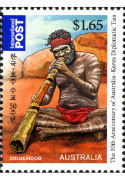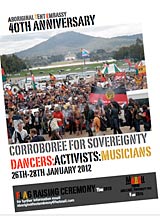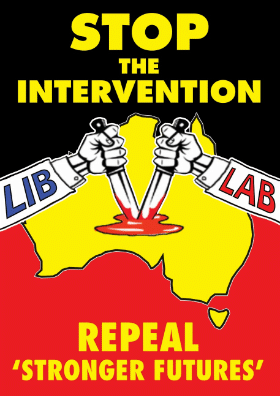History
Timeline results for 2011
Found 383 results for your search. Showing page 2 of 20.
Year from 2011
2011
-
The Federal Court of Australia rules that journalist Andrew Bolt has breached the Racial Discrimination Act by challenging the right of people of mixed descent to claim Aboriginal ancestry. He alleges that they fraudulently draw benefits available only to Aboriginal people.
-
Aboriginal directory service inguides.com.au launches Australia’s first Indigenous mobile application.
-
In response to the NT intervention, leaders in East Arnhem Land found the Yolngu Nations Assembly (Yolŋu Makarr Dhuni) in Galiwinku to resource practical work toward a treaty for Arnhem Land by facilitating engagement between the Aboriginal Maḏayin form of tribal government and the Westminster forms of governments.
-
Dr Aunty Ruby Langford Ginibi dies. She was one of Australia’s foremost Aboriginal authors and wrote numerous books, short stories and poetry. Her trademark term was ‘edu-ma-cating’ non-Aboriginal people about Aboriginal peoples’ circumstances and struggle. ⇒ Aboriginal books
-

An identical stamp was issued in Korea to celebrate the relationship with Australia. Australia Post issues a stamp showing an Aboriginal didgeridoo player for the 50th anniversary of the Australian–Korean relationship which was forged during the Korean War. Official diplomatic relations begun in 1961 and developed into a strong partnership. The other stamp shows a Haegeum musician.
-
Gamilaroi man Chris Bourke becomes the ACT’s first Aboriginal government minister, taking on the portfolios of Aboriginal and Torres Strait Islander Affairs, education and training.
-
Northern Territory elders and community representatives issue a statement rejecting an extension of the NT intervention legislation. Aboriginal people were "traumatised" by the intervention, and the government should talk to the elected elders instead of a "chosen few".
-
The government releases an evaluation report of communities affected by the NT intervention which claims that about 80% of people say new police, and 75% better night patrols, improved safety in their communities. The report cites half of the people surveyed strongly agreeing that services had improved. [1]
-
The Australian government introduces the Stronger Futures in the Northern Territory Bill 2011 to the Parliament to extend the intervention. The new laws will be reviewed after 7 years and 'sunset' 10 years after their start.
2012
-
Several Aboriginal politicians are elected to the Northern Territory Legislative Assembly:
- Bess Price (Country Liberal Party), representing the seat of Stuart.
- Francis Kurrupuwu (Country Liberal Party), representing the seat of Arafura.
- Larisa Lee (Country Liberal Party), representing the seat of Arnhem.
- Ken Vowles (Territory Labor), representing the seat of Johnston.
-
Western Australia renames the Foundation Day public holiday (first Monday in June) as Western Australia Day, for the first time in legislation recognising Aboriginal people as the original inhabitants and traditional custodians of Western Australia.
-
The WA State Government announces the Stolen Wages Reparation Scheme which invites people born before 1958 to apply for payments of up to $2,000 if they had directly experienced government control over their income. The Scheme only compensates wages held by the government, not wages held by private industry or for unpaid work. The low amount causes outrage among Aboriginal people. More than 1,200 people receive compensation [2].
Some people might have spent their entire working lives without receiving any income and the West Australian Government gave them $2,000.
— Judy Harrison, lawyer, Kununurra Community Legal Centre [2] -

40th anniversary of the Aboriginal Tent Embassy. The Aboriginal Tent Embassy in Canberra celebrates its 40th anniversary. An incident where the Prime Minister was disturbed by around 50 protesters outside a restaurant makes security guards drag her hurriedly into a car. She loses a shoe, gaining her the nickname ‘Gingerella’ (alluding to Cinderella and PM Julia Gillard’s red hair). Media reports grossly exaggerate the events.
-
Gadigal-Wirradjuri man Matthew Myers becomes the first Aboriginal Australian to be appointed to the bench of the federal court.
-
Three former Aboriginal children’s homes are added to the NSW State Heritage RegisterCootamundra, Bomaderry Aboriginal Children’s Home and Kinchela Aboriginal Boys Training Home.
-
A Senate Committee reports back to government. The committee had travelled to Hermannsburg , Alice Springs, Maningrida and Darwin to record Aboriginal people's evidence as to the harm that had been done to them by the intervention and their rejection of the new Stronger Futures legislation. Federal Indigenous Affairs Minister Jenny Macklin, who had asked for the Senate Inquiry, subsequently overrides the findings by bringing in an early vote.
This unsavoury process shows just how little government cares about the views of Aboriginal people or about working in partnership with NT Aboriginal leaders.
— Michelle Harris, journalist [3] -

Protest poster against the Stronger Futures legislation. The Stronger Futures legislation passes through the lower house. Among the new measures is a potential jail term of 6 months for the possession of a single can of beer, and 18 months for more than 1.35 litres of alcohol.
-
Between March and April, Aboriginal people set up tent embassies in Brisbane, Moree and Perth to draw attention to issues such as sovereignty and native title.
-
The Department of Indigenous Affairs in Western Australia finally releases the report of its 2008 Stolen Wages Taskforce. Download the 2008 Taskforce report.
-
On TV Channel ABC, former prime minister Malcolm Fraser criticises the new government legislation on the NT intervention.
If you could translate it back over 100 years, I think AO Neville, protector from Western Australia, would be proud of this legislation. It is racist. It is paternalistic.
— Malcolm Fraser, former prime minister [4]
References
View article sources (4)
[1]
'Response to NT Intervention heats up, Koori Mail 513 p.8
[2]
[2a]
'Long fight for stolen wages for Western Australia's Aboriginal stockmen and women', ABC 27/7/2015
[3]
'Democratic process in tatters', Online Opinion, 29/2/2012, www.onlineopinion.com.au/view.asp?article=13309, retrieved 3/3/2012
[4]
'Fraser labels NT intervention laws 'racist'', ABC Online, www.abc.net.au/lateline/content/2012/s3449248.htm, retrieved 14/3/2012


